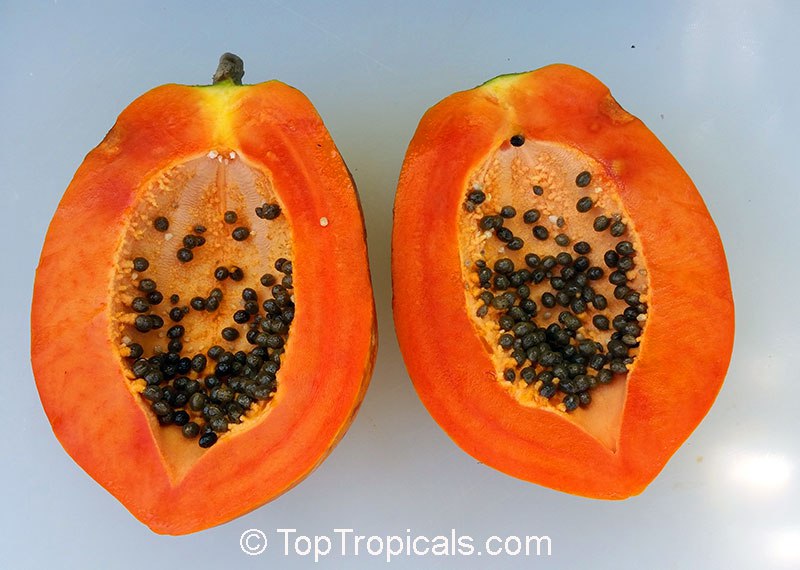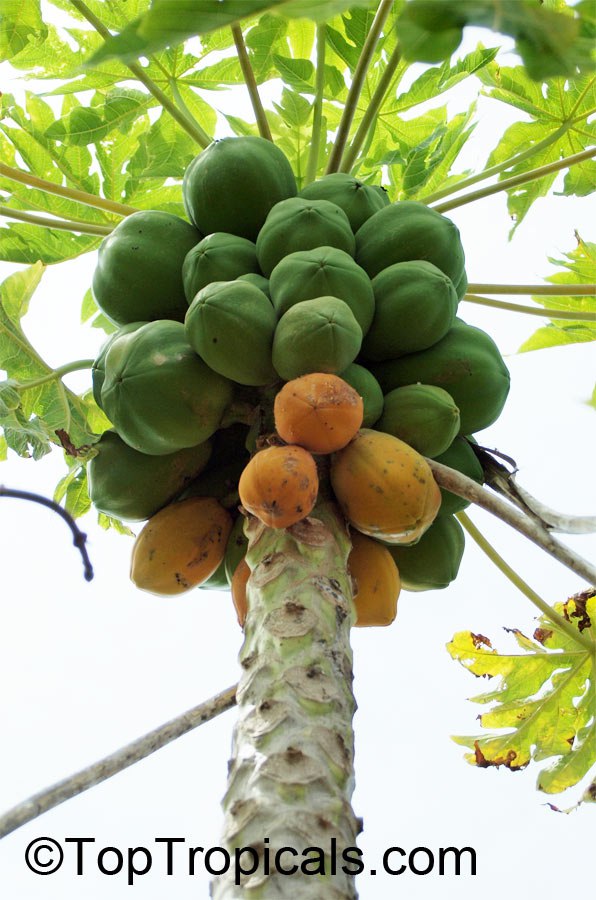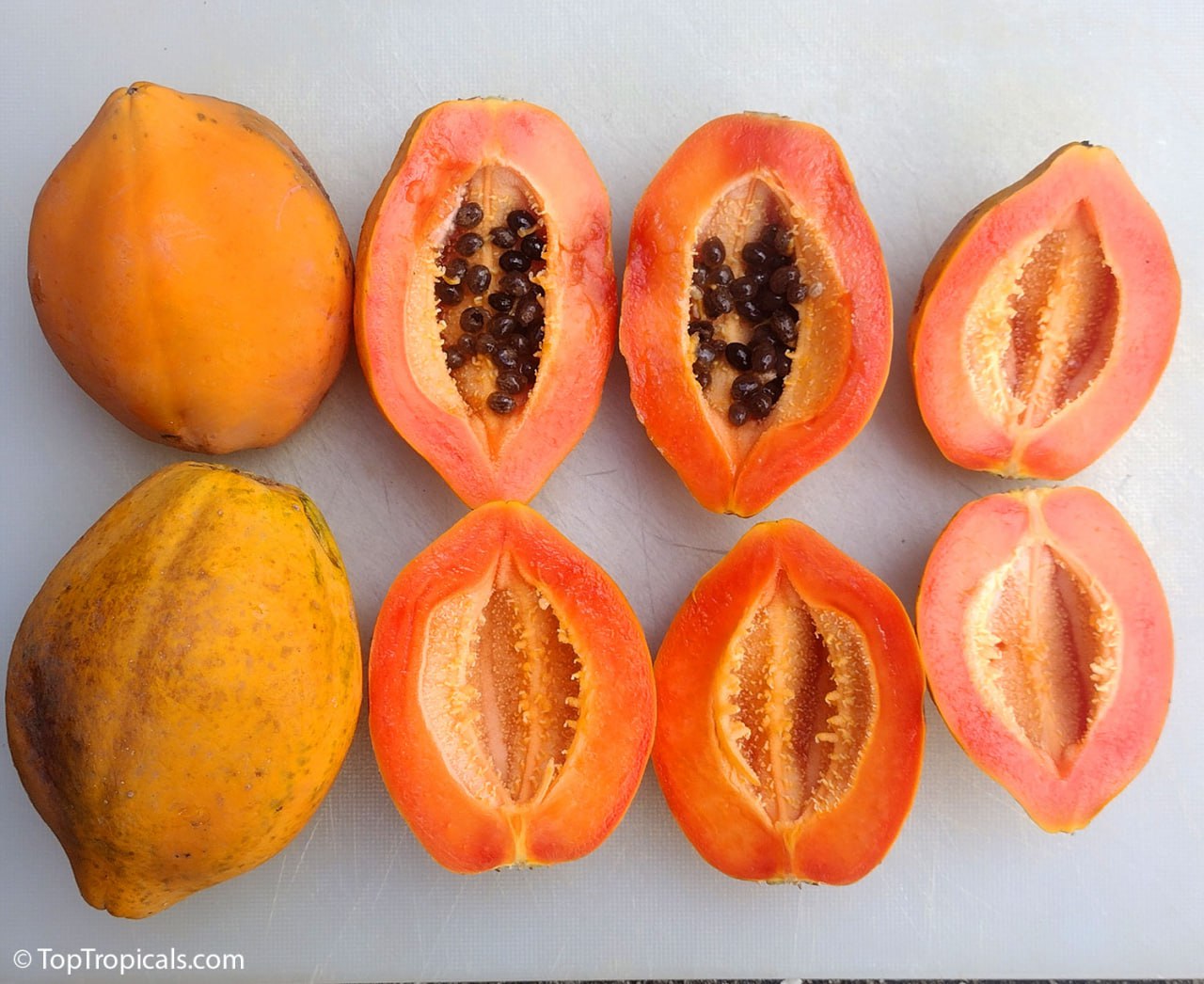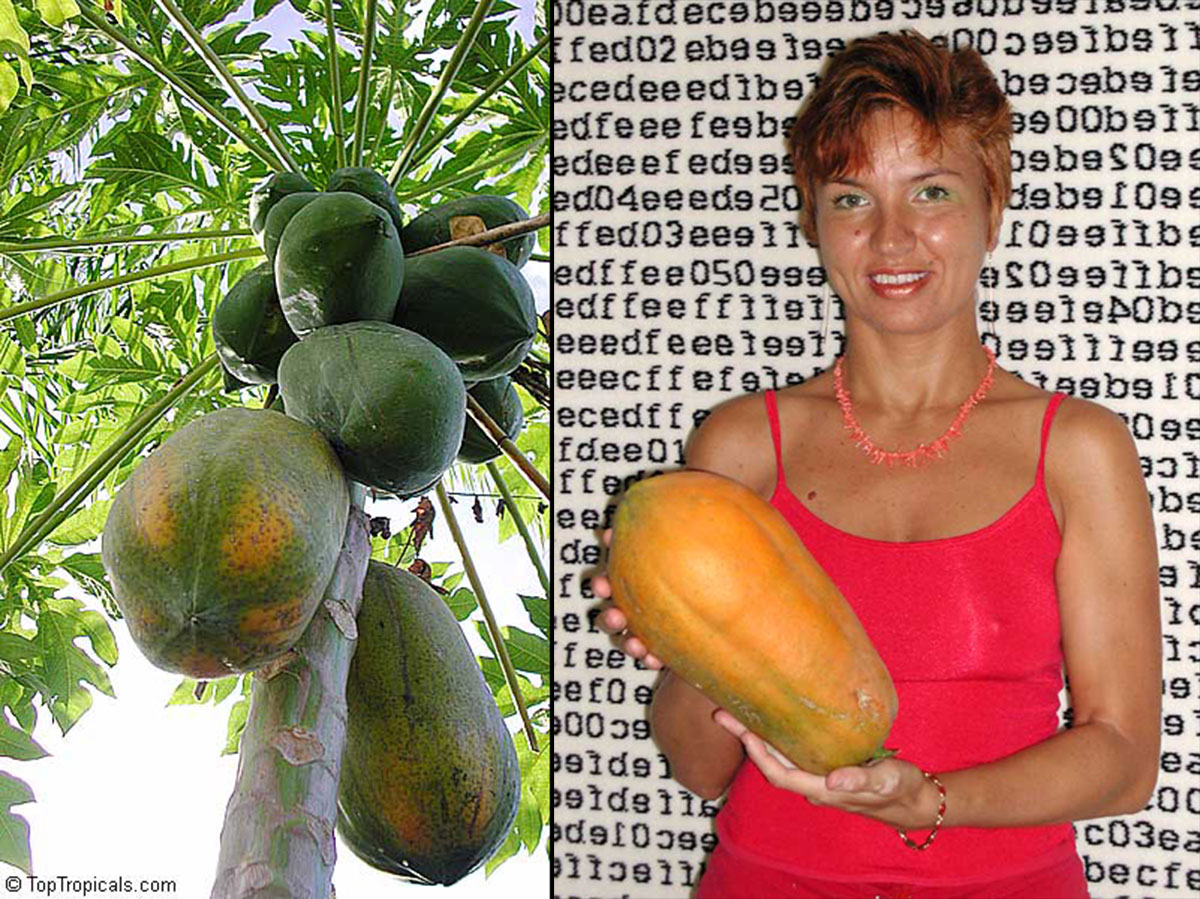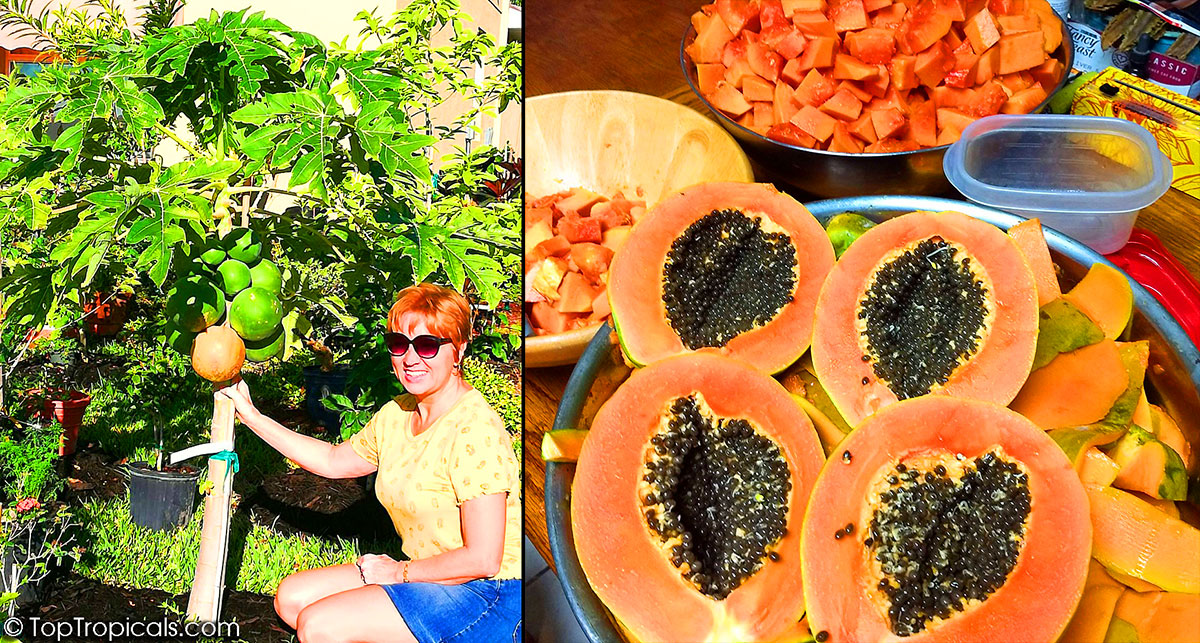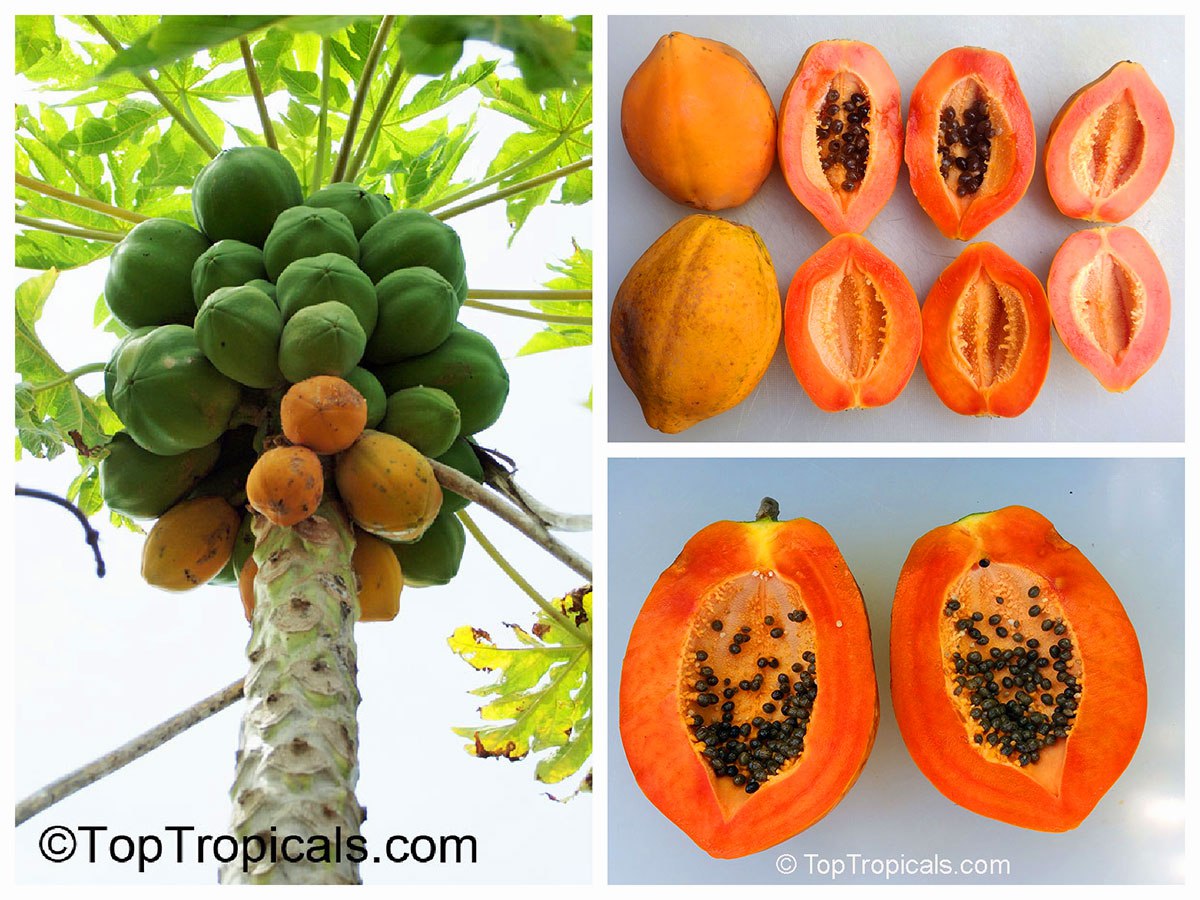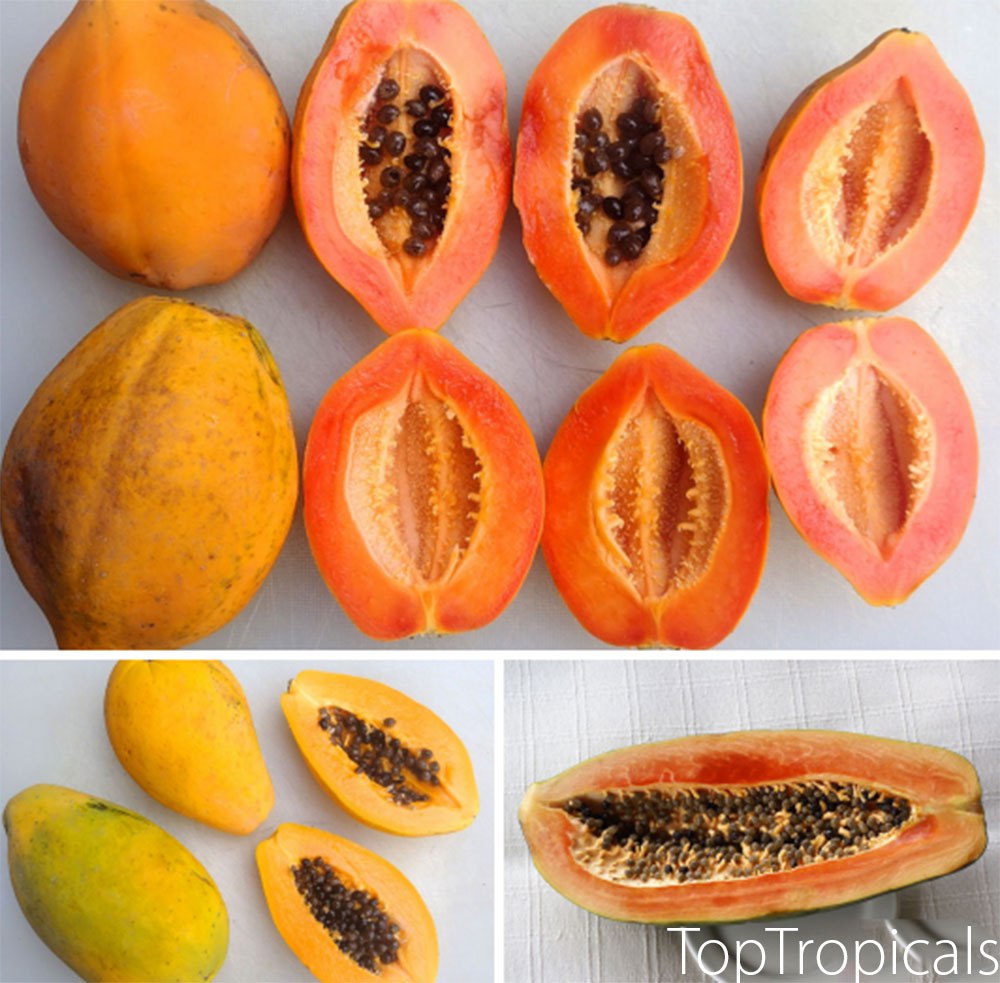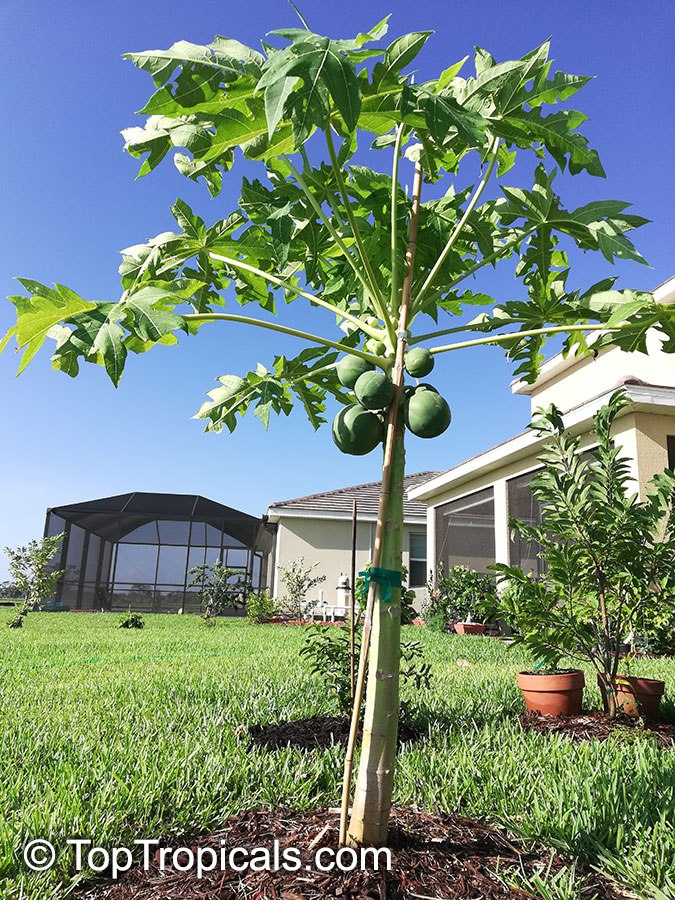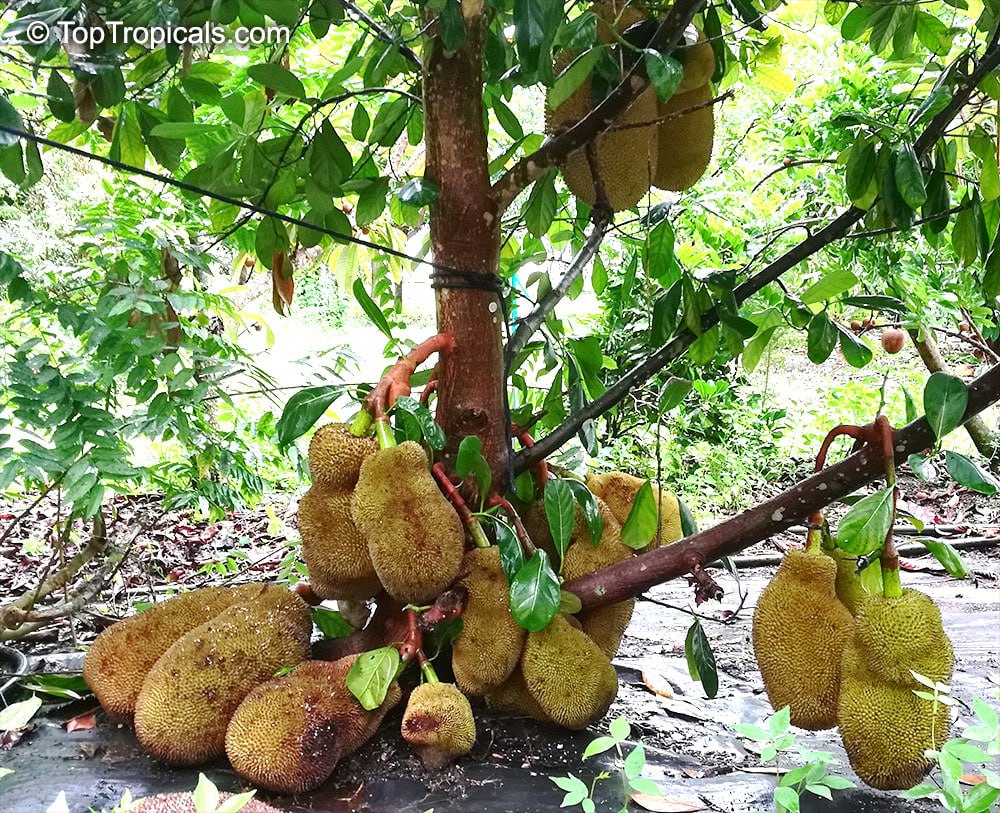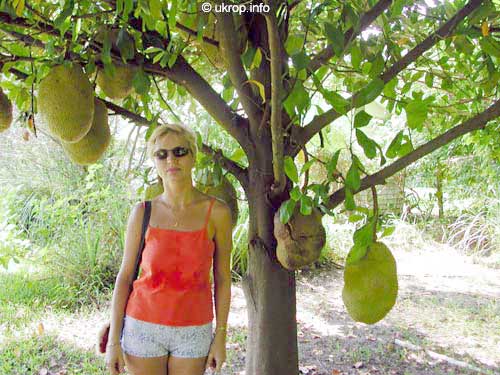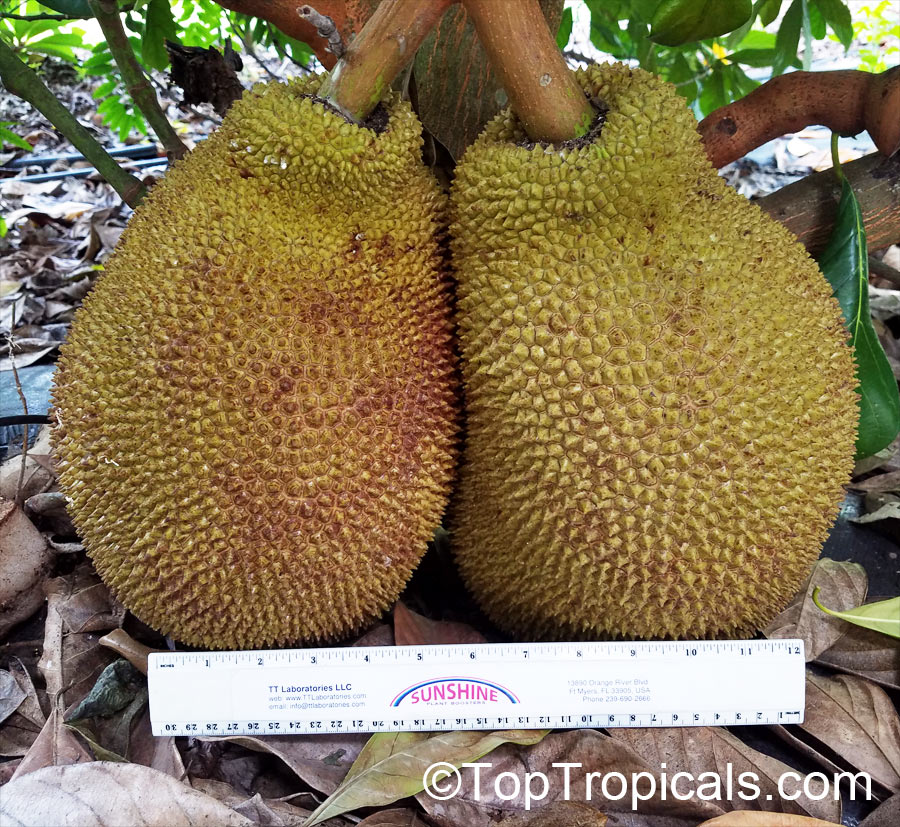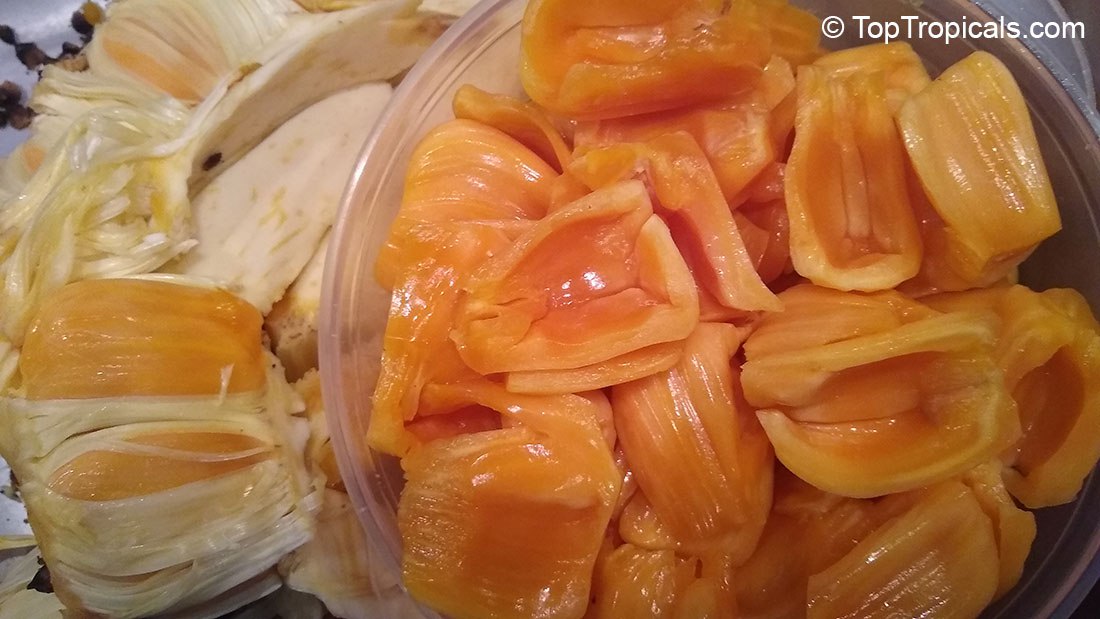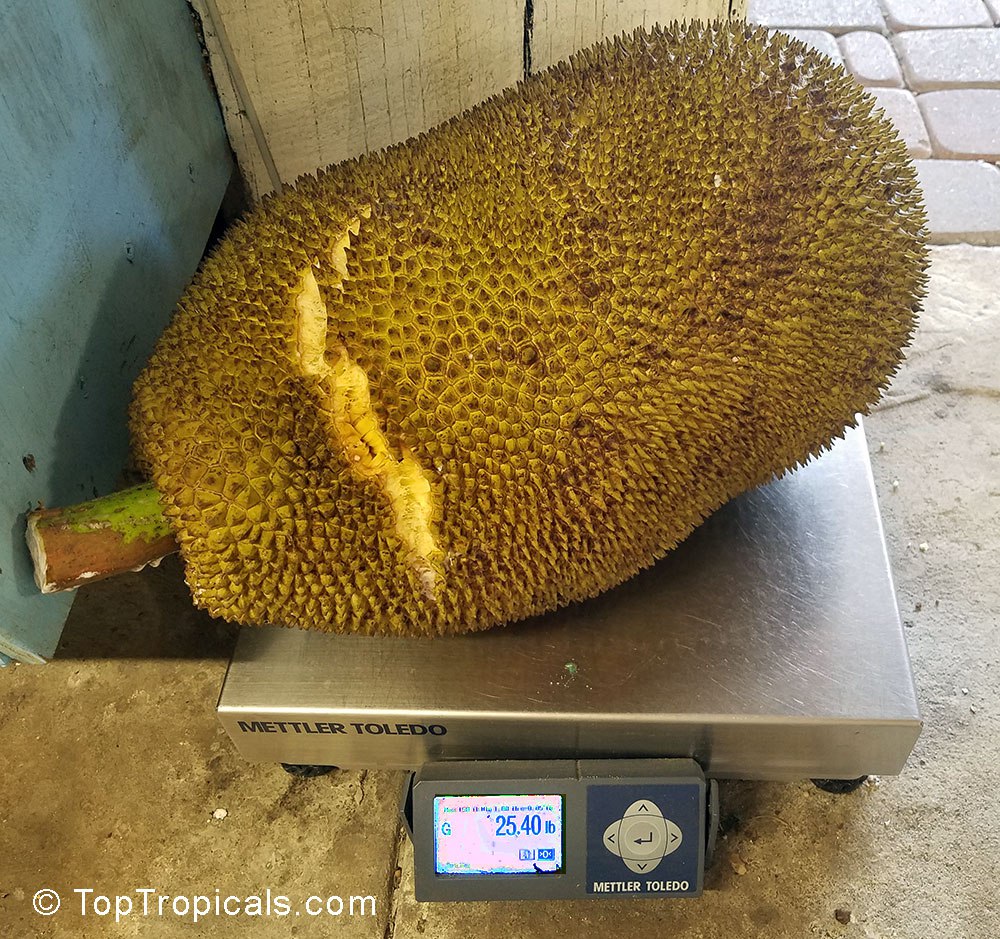Garden Blog - Top Tropicals
Fun Facts: Cacao beans
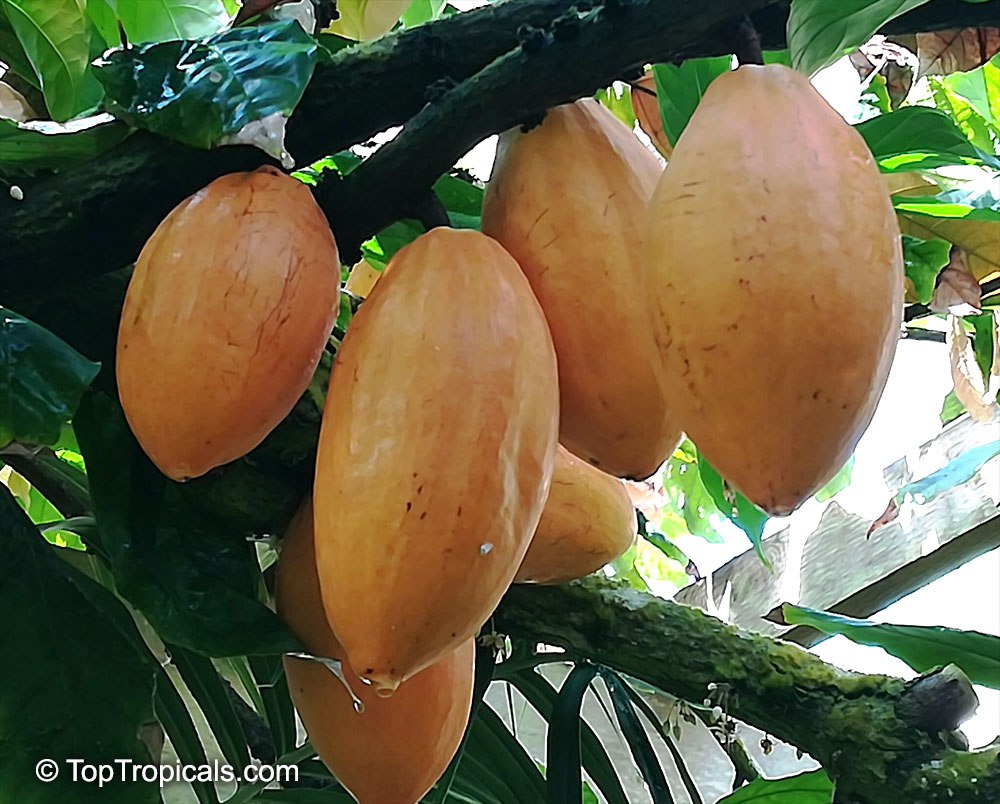
Cacao Chocolate Tree (Theobroma cacao)
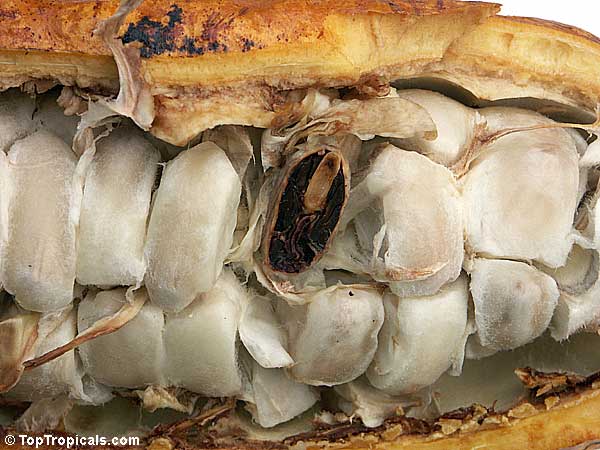
Cacao Chocolate Tree (Theobroma cacao)
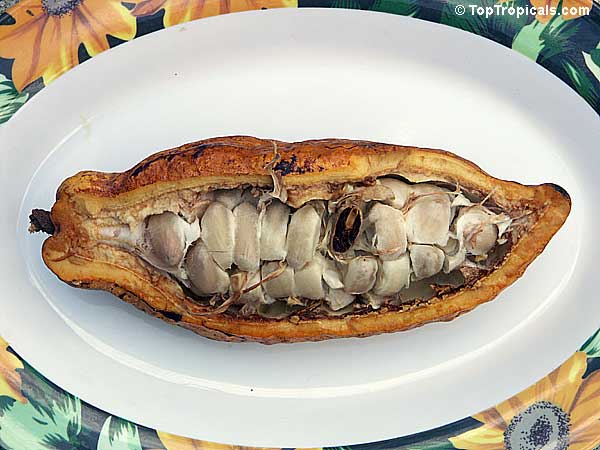
Cacao Chocolate Tree (Theobroma cacao)
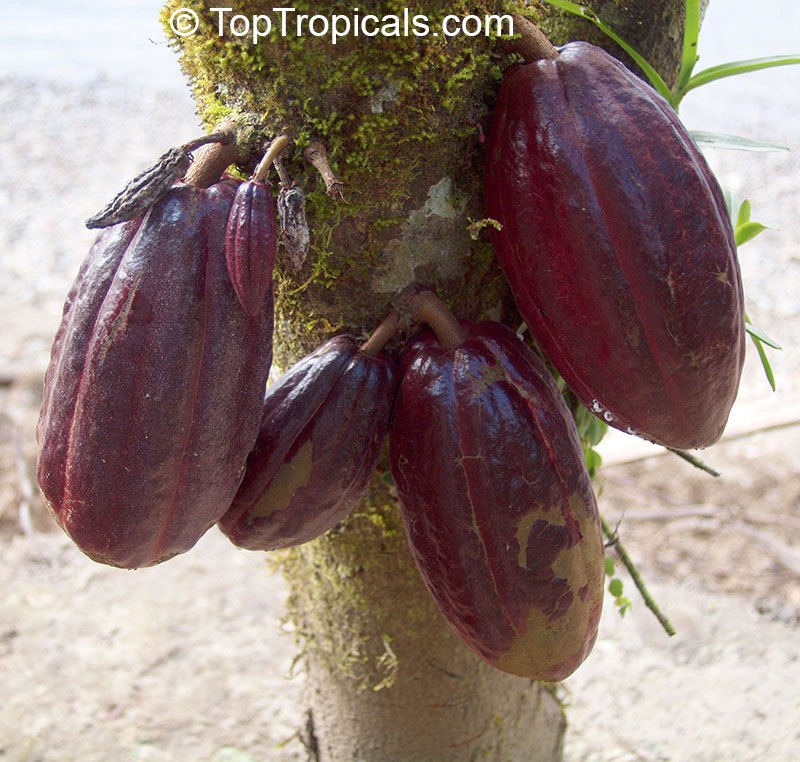
Cacao Chocolate Tree (Theobroma cacao)
🛒Get your own Chocolate Tree
#Fun_Facts #Food_Forest
JOIN 👉 @TopTropicals
The truth about Papaya:
1) it is grass, and
2) it can go transgender!
The secret facts of Papaya's private life.
- 📌 Did you know that Papaya technically is not a tree? It is a large herbaceous plant, usually with a single, straight trunk that can reach 30 feet!
- 📌 Many dwarf varieties available in selection, reaching only 6-8 ft tall, but producing large crops of full size fruit - they are easy to harvest.
- 📌 Papaya trees have very complex gender mechanism, but the bottom line is - the tree can chance its sex based on conditions! Many varieties are self-fertile, but it always recommended to plant a few trees for cross-pollination and better yield.
- 📌 The sweetest Papaya is from so called "Solo" cultivars: the fruit is usually round or oval, on a smaller side, but super sweet.
- 📌 Fruit from Solo cultivars are not susceptible to fruit flies.
- 📌 Being officially a tropical plant, Papaya is pretty cold resistant and can withstand light freeze without significant damage.
- 📌 Surprisingly, Papayas are also hurricane-resistant plants and can take strong winds without damage. They still stand when other trees are down!
- 📌 Papaya is one of the Super-Foods thanks to papain - a natural enzyme containing in this fruit. Papaya fruit offers the best digestive aid! Eat some papaya after each meal to maintain healthy digestion.
- 📌 Try papaya leaf wraps for cooking meats - you won't need a meat tenderizer!
- 📌 Easy to grow trees, Papayas don't take any space in the garden, but bring so much goodness into your life!
🛒 Shop Papaya Trees
#Food_Forest
🏵 TopTropicals
Date:
Carefree
Garden:
How easy is it to grow a Papaya tree?
Q: What is the easiest to grow fruit tree? It must tolerate, heat, rains, and hurricanes! I live in Florida.
A: Papaya is the easiest to grow fruit tree. In our garden in Florida, newly planted Papaya trees survived several hurricanes, frosts, drought and heat, and keep producing year around!
We all enjoy eating Papaya fruit every day. It is great for digestion and is a perfect naturally sweet, healthy snack. Even our PeopleCats love Papaya. Check out this short video how our cat Cash is begging for his daily Papaya treat!
Why do we love Papaya? Fun facts about Papaya:
Not a tree: Papaya is technically a giant herb with a single, straight trunk that can grow up to 30 feet tall.
Gender flexible: Papaya plants can change their gender based on environmental conditions. This complex mechanism ensures better adaptability.
Cold and wind resistant: Papayas can withstand light freezes and strong winds, making them surprisingly hardy for a tropical plant.
Solo cultivars: These smaller, round or oval papayas are incredibly sweet and less susceptible to fruit flies.
How to grow a Papaya Tree: Practical Guide
Papaya is one of the fastest fruiting plants to grow. Often starting production the same year from planting a seed, papayas are ideal for gardeners seeking quick rewards. Many dwarf varieties reach only 6-8 feet tall, yet produce large crops of full-sized fruit that are easy to harvest. Papaya trees are space-efficient, making it possible to plant multiple trees in even small gardens. Plant 2-3 different cultivars to enjoy year-round harvests of healthy, delicious fruit.
How Easy Are Papaya Trees to Grow?
Papaya trees are exceptionally easy to grow. Technically a large herbaceous
plant rather than a true tree, they are resilient and adaptable. They can
tolerate light freezes and even hurricane winds without significant damage.
Additionally, many varieties are self-fertile, but planting multiple trees
encourages better pollination and higher yields.
What Light Levels and Soil Types Are Ideal?
Papayas thrive in full sunlight, so choose a sunny spot in your garden or
balcony. They prefer well-draining, fertile soil enriched with organic matter.
Add compost or manure to improve soil quality and ensure healthy growth.
Avoid waterlogged areas as papayas are sensitive to standing water.
How Much Watering Is Required?
Papayas need some watering to thrive, especially during the growing and
fruiting seasons. Water deeply once or twice a week, depending on your climate,
ensuring the soil remains moist but not waterlogged. Mulching around the base
helps retain moisture and regulate soil temperature.
Growing Papayas in Containers
Papayas can be successfully grown in large containers, making them ideal
for gardeners in cooler regions or those with limited space. Choose a container
at least 7 gallons in size with good drainage. Use a rich, well-draining
potting mix, and place the container in a sunny location. Select dwarf varieties
to keep the plant manageable and productive.
Health Benefits of Papaya
Papaya is considered a superfood due to its high nutritional value. Rich in
the enzyme papain, it aids digestion and promotes gut health. Papaya is also
an excellent source of vitamins A, C, and E, as well as antioxidants that
boost immunity and overall wellness. Additionally, papaya leaves can be used as
wraps for cooking meats, naturally tenderizing them.
Papayas are a low-maintenance, high-reward addition to a Southern garden or greenhouse collection, whether in the ground or in a container. Their fast growth, year-round fruiting potential, and health benefits make them a must-have for gardeners and fruit enthusiasts alike.
Photo above: For small gardens, limited space, or container culture, choose dwarf varieties that remain compact and short (5-8 ft tall) while producing a tremendous amount of fruit! Most productive dwarf varieties: Red Vietnam, Lady Red, TR Hovey, Wan Deng. Semi-dwarf: Waimanalo, Sunrise.
Top 10 fast-fruiting trees:
#6. Papaya (Carica papaya)
Papaya is probably the fastest fruiting tree that can start production the same year from planting a seed. Many dwarf varieties available in selection, reaching only 6-8 ft tall, but producing large crops of full size fruit - they are easy to harvest. Plant 2-3 Papaya trees of different cultivars that fruit at different times of the year and enjoy heavy crops of healthy fruit year around! Another benefit - this tree doesn't take much space in the garden, you can plant as many as you want.
📚 Learn more from previous post:
- 💋 How to have fresh Papaya fruit year around
- 💋Top 3 most wanted Papaya varieties
- 💋The secret facts of Papaya's private life
- 💋Papaya-Citrus Marinade
- 💋Top 10 fast-fruiting trees
🛒 Shop Papaya varieties
#Food_Forest
🔴 Join 👉 TopTropicals
Date:
Forget the gym and get to gardening?
Fun workout? We never have enough time to go to the
gym or do an exercise so it's good to know that just doing something that you
love can give you a workout. We all know that when we are out in the garden
it gives us a bit of exercise but we do not realize how much exactly.
Research says that three hours of gardening can have the same effect as an intense
1-hour gym session. The study was carried out with a group of 100 gardeners who
were asked to monitor the amount of time spent doing a series of common
gardening tasks over a four week period. Gardening tasks that were monitored included weeding, digging, mowing the lawn, hedge trimming, trimming shrubs and trees,
raking, planting shrubs, and moving garden waste using a wheel barrow. Here are some facts and numbers:
- Just doing half an hour weeding can burn up to 150 calories and tasks that handle heavy electrical equipment such as hedge trimming will give you a good workout burning 400 calories per hour.
- Spending a day or five hours each week in the garden will burn up to around 700 calories
- Over a gardening season that works out at 20,000 calories per year, equivalent to running seven marathons
- The gardening hobby could help burn a million calories over a lifetime.
Calories burned with only
1 hour of:
340 cal - Chopping wood, splitting logs, gardening with heavy power tools, tilling a garden, chain saw. Mowing lawn, walk, hand mower. Shoveling by hand.
272 cal - Carrying, loading or stacking wood, loading/unloading or carrying lumber, digging, spading, filling garden, composting, laying crushed rock or sod. Clearing land, hauling branches, wheelbarrow chores.
238 cal - Operating blower, walking. Planting seedlings, shrubs, trees, trimming shrubs or trees, manual cutter. Weeding, cultivating garden.
224 cal - Raking lawn, sacking grass and leaves
136 cal - Picking fruit off trees, picking up yard, picking flowers or vegetables. Walking, gathering gardening tools.
102 cal - Walking, applying fertilizer or seeding a lawn
34 cal - Watering lawn or garden, standing or walking
Radio Top Tropicals Live
Webcast upcoming event: Saturday May 20, at 11 am EST.
Topic: Come Ride My Peninsula! Discusses the REAL Florida. Our plants, the Everglades, how all of the wonderful plants Top Tropicals has to offer are grown in South Florida.
Our Host Robert Riefer - Internationally Certified Crop Adviser and Weed Scientist - answering all your gardening questions.
Listen to Radio Top Tropicals, every
Saturday, at 11 am EST! You may use our website radio player DURING AIR TIME. To ask questions using live chat, you need to log in
at Mixlr.com or simply
call our office 239-887-3323 during air time!
If you missed a live webcast, you may listen to recording by following Showreel item link.
Check out our upcoming radio shows and get your gardening questions
ready!
Date:
Forget the gym and get to gardening?
Calories Burned Gardening
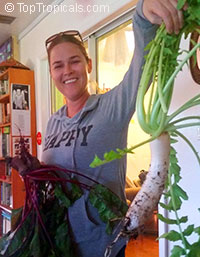
Fun workout? We never have enough time to go to the gym or do an exercise so it's good to know that just doing something that you love can give you a workout. We all know that when we are out in the garden it gives us a bit of exercise but we do not realize how much exactly. Working out in the yard is a healthy hobby for many reasons, the high number of calories burned gardening being one of them. When you do this kind of physical labor, you carry out a wide variety of movements that most definitely burn calories, and may even tone. The best part about it in terms of physical activity is that if you enjoy yard work at all, you aren't watching the clock or counting down the minutes until you are done (the way that many people do while they are on a treadmill). You can easily spend a whole afternoon or an entire day working without feeling as though you are putting yourself through a mentally grueling workout. Finding physical activities that you enjoy are key to maintaining a healthy weight throughout your lifetime, and this hobby is a perfect example of that scenario for many people.
Research says that three hours of gardening can have the same effect as an intense 1-hour gym session. The study was carried out with a group of 100 gardeners who were asked to monitor the amount of time spent doing a series of common gardening tasks over a four week period. Gardening tasks that were monitored included weeding, digging, mowing the lawn, hedge trimming, trimming shrubs and trees, raking, planting shrubs, and moving garden waste using a wheel barrow. Here are some facts and numbers:
- Just doing half an hour weeding can burn up to 150 calories and tasks that handle heavy electrical equipment such as hedge trimming will give you a good workout burning 400 calories per hour.
- Spending a day or five hours each week in the garden will burn up to around 700 calories
- Over a gardening season that works out at 18,772 calories per year, equivalent to running seven marathons
- The gardening hobby could help burn a million calories over a lifetime.
Calories burned with only 1 hour of:

340 cal - Chopping wood, splitting logs, gardening with heavy power tools, tilling a garden, chain saw. Mowing lawn, walk, hand mower. Shoveling by hand.
272 cal - Carrying, loading or stacking wood, loading/unloading or carrying lumber, digging, spading, filling garden, composting, laying crushed rock or sod. Clearing land, hauling branches, wheelbarrow chores.
238 cal - Operating blower, walking. Planting seedlings, shrubs, trees, trimming shrubs or trees, manual cutter. Weeding, cultivating garden.
224 cal - Raking lawn, sacking grass and leaves
136 cal - Picking fruit off trees, picking up yard, picking flowers or vegetables. Walking, gathering gardening tools.
102 cal - Walking, applying fertilizer or seeding a lawn
34 cal - Watering lawn or garden, standing or walking
Sources: DailyMail, CalorieLab, FitnessBlender.
How to have fresh Papaya fruit year around
- 🟠 Many people include Papaya fruit in their daily diet because of its healing properties for digestive system. You can eat Papaya fresh as a tasty dessert, add to salads ripe or green, use fruit and leaf wraps in cooking - possibilities are endless.
- 🟠 Buying papaya fruit from the store every day can become costly. So you can plant your own tree - Papayas are heavy producers. But like with many fruit trees, the question may arise:
❓ What to do with so many fruit at once, and where to get the fruit when it's out of season?
- 🟠 The answer is: plant several varieties. Different Papaya cultivars, similar to Mango and Avocado, have different crop seasons.
- 🟠 If you want to enjoy fresh delicious Papaya fruit year around, plant several Papaya varieties in your garden that have different ripening times.
- 🟠 Papaya tree doesn't take any room in your garden: similar to a palm tree, all its leaves/crown is up high, so you can plant as many trees as you want in a very limited space and still use the room under Papaya tree for other plants.
For example:
Waimanalo - ripens from July to October and sporadically throughout the year.
Sunrise - ripens from January through September and sporadically throughout the year.
Maradol - ripens from August through March and sporadically throughout the year.
🛒 Limited time offer: Papaya collection - 3 trees for half price!
Shop Papaya varieties
📚 Learn more from previous posts:
The secret facts of Papaya's private life
Top 3 most wanted Papaya varieties
#Food_Forest
🏵 TopTropicals
Index of TopTropicals Telegram Channel
Follow these tags to find your interests:
#Butterfly_Plants - Butterfly attracting plants.
#Container_Garden - Plants suitable for container garden and indoor culture.
#Fertilizers - All the truth about fertilizers, plant food supplements, and our recommendations for different types of plants.
#Food_Forest - Fruit trees, Spice plants, and Edibles.
Including: #Avocado, #Mango, #Papaya, #Guava, #Jackfruit, #Loquat
📖 #Fun_Facts - interesting plant facts and legends.
🌳 #Hedges_with_benefits - Practical approach to your landscape and how to properly select showy and useful plants for your yard.
♍️ #Horoscope - Plant Horoscopes and Cat Horoscopes. Did you know that cats also have their Zodiac signs?
🛠 #How_to - Q&A about growing plants, tropical garden lifehacks.
👀 #Nature_Wonders - Unusual, amusing, outrageous, bizarre plants...
🐈 #PeopleCats - our Favorite PeopleCats (and some PeopleDogs, too).
🌸 #Perfume_Plants - Fragrant plants and perfume trees.
✍️ #Quotes - Interesting quotes.
#Recipes - Exotic recipes for tropical fruit and edibles.
💊 #Remedies - Medicinal plants.
☁️ #Shade_Garden - Plants suitable for low light conditions.
🌼 #Trees - Spectacular flowering tropical trees.
🏆 #Win - Contests, Sweepstakes, and other specials.
Join and share with friends👇🏵
TopTropicals
Date:
Our sales, news and updates
Radio Top Tropicals Live Webcast upcoming event: Saturday February 18, at 11 am EST.
Topic: WEED OR WONDER PLANT?
We will explore plants considered invasive species, or weeds, here in Florida, and reveal interesting and not-so-well-known facts about them.
1) Schinus terebinthifolius - Brazilian Pepper, or Florida Holly. This species is essential for migratory birds, bears, and other critters. Berries are used in China for medicine. Used as a spice in Italy, as well as here in the US.
2) Phyllanthus amarus - Seed on the leaf. A scourge of nurseries, it may yet lead to the cure of Hepatitis B & C.
3) Melaleuca leucophylla - Punk tree, Paper tree. One of the finest trees for raising of epiphytes. Tiger Balm brand ointment is made from these trees. An excellent timber source as well.
Our Host Robert Riefer - Florida State Certified Crop Adviser, and Weed Specialist - answering all your gardening questions.
Listen to Radio Top Tropicals, every Saturday, at 11 am EST! You may use our website radio player DURING AIR TIME and see the pictures of plants we are talking about. To ask questions using live chat, you need to log in at Mixlr.com or simply call our office 239-887-3323 during air time!
If you missed a live webcast, you may listen to recording by following Showreel item link.
Check out our upcoming radio shows and get your gardening questions ready!
New Article: Aphrodisiacs of the plant world.
Last Saturday, the topic of our Webcast was Plants of Love - Aphrodisiacs (click to listen to recording).
Today, we are introducing an article by Kristi, our Meet the Gardener host - Aphrodisiacs of the plant world.
Date:
How
to grow Jackfruit in a pot:
the biggest fruit in the world
Q: Can I grow Jackfruit in a pot?
A: Yes, you can! Jackfruit trees, despite producing the largest tree-borne fruit in the world - up to 80 pounds and 36 inches long - can thrive and fruit in containers. The tree has a clever feature: it grows fruit only at the base of the trunk, allowing you to manage its height and size. With regular pruning, the tree can stay compact at just 6-7 feet tall, making it perfect for pot culture.
1. Getting started: pot sizes and growth tips
Start with: A 3-7 gallon container.
As it grows: Gradually increase to a 15-25 gallon pot by the time it
reaches fruiting size (2-4 years).
Pruning is key: Keep the tree topped at 6-7 feet to focus its energy
on fruit production.
Fertilize regularly: Use high-quality plant food like Sunshine Boosters C-Cibus to promote healthy growth and fruit
development. C-Cibus is the best natural plant food for fruit and edibles.
2. Fun facts about Jackfruit - Artocarpus heterophyllus
A mature Jackfruit tree can produce 200 pounds of fruit per year.
The fruit consists of large, sweet, yellow bulbs with a banana-like
aroma.
Seedlings start fruiting within 3-4 years, with fruits ripening in just 4-6
months after flowering.
3. Cold tolerance of Jackfruit trees
Though often thought of as ultra-tropical, mature trees can withstand light frost for short periods without major damage. Keeping Jackfruit in pots also offers an easy way to move them indoors during cold spells if you're in a cooler climate.
4. Secrets for successful Jackfruit production
- Frost-free temperatures are essential.
- Use rich, organic soil with compost, manure, or peat moss.
- Maintain moist soil with regular watering.
- Constant pruning to keep the tree under 7 feet promotes healthy
fruiting.
- Apply fertilizer and microelements regularly for better fruit quality.
By following these tips, you'll be able to enjoy the world's biggest fruit right from your patio!
Learn more:
About Jackfruit
How to grow the
biggest fruit on Earth
Cheena - Jackedack
Videos:
Jackfruit
Fruit
